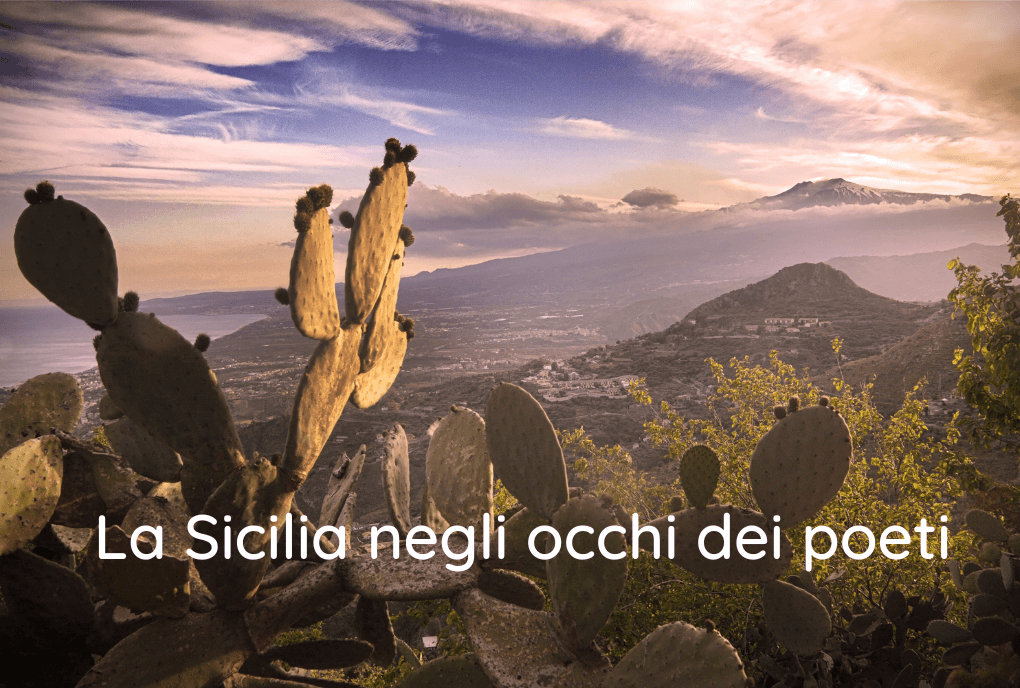
Sicily: the wonder that of the poets kidnapped the heart
From Quasimodo to Pascoli to Vittorini, the ancient soul of this land exudes in the verses of those who were born here or fell madly in love with it. How come the poetics of so many names in literature are so steeped in the Sicilianity? Have youever gone on a journey that brought you back home with more awareness?
Let’s try to understand why this land crosses the soul like a raging river.
Dilated spaces and slow times
There is a certain condition of the spirit that happens to you in Sicily. It is difficult to explain a perception, a condition of the soul without the eyes of poetry, which penetrates things and gives us back the meaning of life. Perhaps that is why Pastures, though so reluctant to leave his Romagna, said he spent the most “radiant years of visions and sonorous of harmony” here. In that sea of Sicily that If you dip a hand in it drips blue, which is Full of voices under the cobalt blue, resonates the echo of his childlike, able to marvel at small things, to look at life with enchantment. We are, after all, all exiles from our childhood, of that place from where our story branches out and where it is destined to return, that place where we are centered, no longer alone or fragile.
In the unspoiled beauty of Sicily Pascoli finds that place again. With the narrative slowness that the train allows, it frames from the window a signature shot of the island, which Suddenly it appears to him, rose cloud rose from the sea e every wind turns into a sweet melody and the whole atmosphere is a dream, smoke sings coming out of the huts to the flowering hedges, salt breezes, cicada verses. Pastures likes Messina, ancient Zancle, Lovely hooked sickle cutting into the blue the most beautiful harbor in the world. He is captivated by the greenish blue of the beautiful Mount Peloro green with lemons and glaucous with prickly pears, From the purple iridescences of the sunset on Aspromonte which, to the eyes, is colored with inexpressible hues. Of the city he even loves the air, where he releases happy kites and childhood memories, there is something new today in the sun, indeed ancient: I live elsewhere and feel that violets have been born around. Pascoli finds home in the vivid colors, the intense scents, the landscapes where nature towers over you and restores that sense of eternity that disarms every busyness of adult life.
But if I return to your shores and sweet voice to song calls from fearful street
I do not know whether childhood or love, anxiety of other heavens turned me
And I hide in the lost things
Quasimodo, castaway of his origins, finds the thread of his bewilderment in the warm and sweet bread of
honey of the Iblei, on the shore of the ancient sea of Greece, on the sand of Gela the color of straw
whereI lay down as a child…with many dreams in my fists. Refresh the parched loneliness to the restorative wind that blows mildly over the heights of Tindari, Hanging over the waters of the sweet islands of the god (Tindari) today you assail me and stoop in your heart. E Tindari assails, with a richness of landscape that seems to encompass the whole of nature, reveals itself between sea and history. It does so in the Shrine of Mary Most Holy overhanging the sea, watching over the lagoon with regal grandeur, guardian of the mystery of the Black Virgin. In the remains of the ancient acropolis, tales of a millennia-old civilization. In Marinello Reserve, where striking stretches of fine sand frame brackish lakes. In the warm, crystal-clear sea that turns to the Aeolian Islands.
The Sicily of myth and poetry has dilated spaces and slow times. Here walking along that pathway among the olive trees, of mint, sage scented, dear to Pirandello, it happens that you find your way back to the
Return, you learn to go back, to the origins and among the lost things.
We are all kind of children of the
cavusù
I am a child of chaos… because I was born in a countryside of ours that is near an intricate forest called … by the people of Girgenti Cavasù … Kaos
How many of us, like Pirandello, have felt at least once prey to the chaos of our own contradictions, lost in the tangled forest of life? Sicily, in the many facets of its landscape, seems precisely to accommodate the seesaw of our changes. Tongues of talcum sand give way to grayish shorelines of exhausted ash, fine sugar beaches alternate with moonscapes, restless volcanic scenery balances an immobile hinterland. There is a black Sicily of the ancient lava stone houses of Catania and a white Sicily of the limestone walls of the Ragusa area, among olive trees, carob trees and palm trees daughters of the African Sea. There is the Sicily of reddish sandstone, where the mountains plunge into the blue of the Italian sea, and the Sicily of gold, among the
laces and cozzi of the hinterland cultivated with tumminia. There is the rugged and hot Sicily of Sciascia, which in autumn totally changes to a somber sky, the vegetation becomes bare and silence looms.
Here Sicily listens to its life. There is the Homeric Sicily coveted by Goethe, which among classical ruins and a riot of scents rediscovers ideal beauty, “the key to everything.” This is the land of the traveler of today and yesterday, looking like Goethe for a destination whose remain image in the spirit. Terra chi ti pìgghia testa e sintimèntu, for Praised and where Comes those who dream.
People of Sicily, people of poetry
The people of Sicily are of ancient kindness, reserved friendliness, a mixture of humanity. In the long walks through the Palazzata and up to the Pescheria, Pascoli meets the good and poor people whom a sound of the ciaramelle came to wake up.
He loves its genuineness, its directness, its simplicity. He catches impressions among the smiles, labors, and daily gestures and understands that here also the people are poetry. One day a little girl instead of begging him gracefully asked him. “Vossia ni duna u sciuri.” And Pascoli is bewitched by that noble dignity. Poetry is among the people of Agrigento that Goethe sees intent on ancient rites, planting fava beans, making soap, burning the stems of the fava beans and the shells of the almonds. Flourishes among salt and sulfur workers In Sciascia’s landscapes. Filter in compassion Of the humble people by Vittorini, sinceCalogero grinder to Ezekiel, sympathize with the offended world. He pops out among the rows of vines of the people of Lodato, intent on the grape harvest with a heart in celebration anchi si lu suli tuttu lu jòrnu pica ntesta. This mixed yet pure and untouched land, which has remained authentic in its landscape and in the habits of its people, is a gift for the traveler who knows how to slow down. Why there is a superfluity that is more necessary in life than what is necessary: poetry. It is taught to you by little girls who ask for ‘u sciuri and do not ask for bread.
Poetry has Sicilian origins
Sky of Alcamo in the 13th century called Sicily “rosa fresca aulentissima.”Oh yes, because although in the wake of the Provençal troubadours welcomed at the lively court of Frederick II of Swabia, the sonnet is a ‘gimmick’ all Sicilian! The illustrious Sicilian was the first language of art.
In the Italian vernacular. Since then, Sicily has not ceased to be a source of great inspiration. It is said that among the alleys of a Taormina Saracen ‘that it almost doesn’t feel like Europe, where everything important that could happen to me happened, Truman Capote Has caught a glimpse of his Holly. Today the Regional Network of House Museums Enhances the residences of illustrious personalities born in or linked to Sicily. Why visit them? To find Pascoli in his studio in Sturiale Palace, intent on decanting the view, from the kitchen you can see the Gonzaga fort on the mountains…from the other window the sea, up Aspromonte. Searching for Quasimodo’s memory among the 6,000 volumes of the Sferro Library dedicated to him. Imagine him here on the slopes of Mount Etna, a happy child among the orange fields and the station premises, now destined to become a museum. Follow his own voice in the study of the birthplace in Modica, among an old Olivetti and record collections, along an evocative journey in verse that culminates in the speech delivered in Stockholm on the occasion of the Nobel Prize award.
Magna Sicilia’s advice? Traveling light
‘The strength to keep the soul of the departed anchored is a virtue’. Perhaps this is the best souvenir of Sicily. We are all navigators, constantly searching for everything and the opposite of everything, loaded with a trunk large enough to hold it. Then, during our sailing, we happen to come across a place that teaches you to look with childlike enchantment, to shed the ballast of the superfluous. Drop anchor in that condition of the soul in which Sicily welcomes you, with its and your contradictions, and you discover that the treasure you were looking for is in traveling light. When you leave not only in the direction of a physical experience, but ready to open yourself ‘to the other and the elsewhere,’ then this land passes through you and reveals all its wonder.
And you, what kind of traveler are you?
by Stefania Capassi
@allrights reserved 184801
Quotations from the works of famous poets have been included in the text





